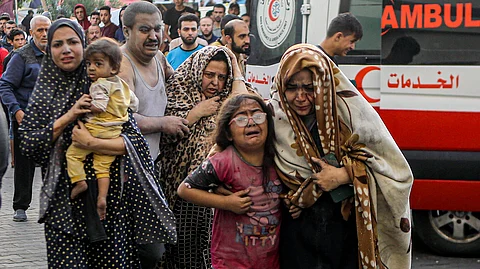Top U.N. court hears genocide case vs. Israel
THE HAGUE, Netherlands — The United Nations’ top court has opened hearings Thursday, Jan. 11, 2024, into South Africa’s allegation that Israel’s war with Hamas amounts to genocide against Palestinians, a claim that Israel strongly denies.
South Africa is initially asking the International Court of Justice to order an immediate suspension of Israel’s military offensive in the Gaza Strip as part of a case that is likely to take years to resolve.
The dispute strikes at the heart of Israel’s national identity as a Jewish state created in the aftermath of the Nazi genocide in the Holocaust.
It also involves South Africa’s identity: Its governing party, the African National Congress, has long compared Israel’s policies in Gaza and the West Bank to its own history under the apartheid regime of white minority rule, which restricted most Blacks to “homelands” before ending in 1994.
Although it normally considers U.N. and international tribunals unfair and biased, Israel has sent a strong legal team to defend its military operation launched in the aftermath of the Oct. 7 attacks by Hamas.
“I think they have come because they want to be exonerated and think they can successfully resist the accusation of genocide,” said Juliette McIntyre, an expert on international law at the University of South Australia.
In a statement after the case was filed late last year, the Palestinian Authority’s foreign ministry urged the court to “immediately take action to protect the Palestinian people and call on Israel, the occupying power, to halt its onslaught against the Palestinian people, in order to ensure an objective legal resolution.”
Two days of preliminary hearings will begin with lawyers for South Africa explaining why the country has accused Israel of “acts and omissions” that are “genocidal in character” in the Gaza war and why it is calling for the court to issue an interim order for an immediate halt to Israel’s military actions. A decision will likely take weeks.
Israel’s offensive has killed more than 23,200 Palestinians in Gaza, according to the Health Ministry in Hamas-run Gaza. About two-thirds of the dead are women and children, health officials say. The death toll does not distinguish between combatants and civilians. In the Oct. 7 attack, in which Hamas fighters stormed through several communities in Israel and killed some 1,200 people, mainly civilians. They abducted around 250 others, nearly half of whom have been released.
‘Meritless’ case
U.S. Secretary of State Antony Blinken dismissed the case as “ meritless “ during a visit to Tel Aviv on Tuesday.
“It is particularly galling, given that those who are attacking Israel — Hamas, Hezbollah, the Houthis, as well as their supporter Iran — continue to call for the annihilation of Israel and the mass murder of Jews,” he said.
The world court, which rules on disputes between nations, has never judged a country to be responsible for genocide. The closest it came was in 2007 when it ruled that Serbia “violated the obligation to prevent genocide” in the July 1995 massacre by Bosnian Serb forces of more than 8,000 Muslim men and boys in the Bosnian enclave of Srebrenica.
South Africa “will have a hard time getting over the threshold” of proving genocide, McIntyre said.
“It’s not simply a matter of killing enormous numbers of people,” she said in an email to The Associated Press. “There must be an intent to destroy a group of people (classified by race or religion for example) in whole or in part, in a particular place.”
Israel’s argument
In a detailed, 84-page document launching the case, South Africa argued Israel has demonstrated that intent. Israel responded by insisting it operates according to international law and focuses its military actions solely against Hamas. It said that the residents of Gaza are not an enemy and that it takes steps to minimize harm to civilians and to allow humanitarian aid to enter the territory.
An Israeli Foreign Ministry statement called South Africa’s case a “despicable and contemptuous exploitation” of the court. The case revolves around the genocide convention that was drawn up in 1948 in the aftermath of World War II and the murder of six million Jews in the Holocaust. Both Israel and South Africa are signatories.
In its written filing, South Africa says it wants the court “to establish Israel’s responsibility for violations of the Genocide Convention; to hold it fully accountable under international law for those violations” and to “ensure the urgent and fullest possible protection for Palestinians in Gaza who remain at grave and immediate risk of continuing and further acts of genocide.”

